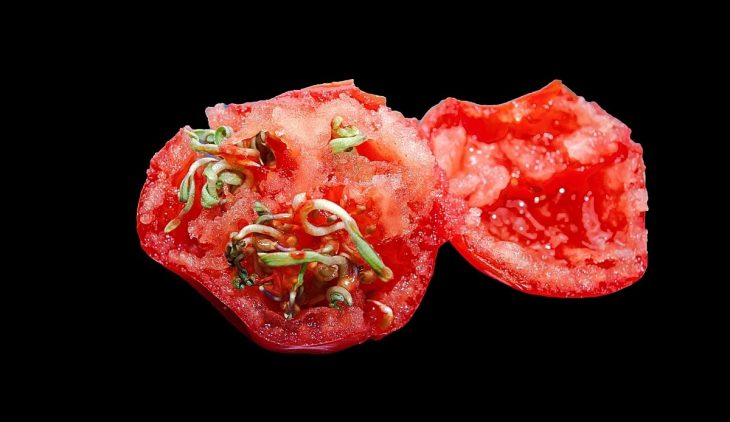In this article, we will discuss and answer the question: Can you eat a tomato with seeds sprouting inside to get to know the truth?
Have you ever sliced into a beautiful red tomato to find the seeds already sprouting? When the seeds sprout, they look like small, green, or white wiggly things. Check keenly to be sure these are not worms but sprouting seeds inside the tomato.
It is common to see tomato seeds sprout inside tomato fruit. This happens because of a lack of hormonal acid. This hormonal acid is what keeps the tomato dormant until the time is right for them to sprout. The seeds are more likely to grow if the tomato has been exposed to prolonged cold for a few days and then moved to heat. Temperatures below 55 degrees Fahrenheit are too cold for harvested tomatoes.
So, Where Do These Sprouting Seeds Come From
Seeds germinating inside the tomato is a process known as vivipary. This process occurs in overripe fruit where seeds have reached maturity, and the ABA abscisic acid’s natural hormone is reduced. In this case, the seed dormancy is lost gradually.
The tomato fruit allows the vivipary process since the seeds do not dry out in a moist environment inside the fruit.

Some causes of seeds sprouting inside the fruit are due to long storage in cool temperatures below 55 degrees Fahrenheit. It could also be because the tomato fruit is overripe, has potassium deficiency, or over-fertilization with nitrogen fertilizer.
However, it is customary to see ripe summer tomatoes begin to sprout their seeds while still whole.
Can You Eat A Tomato With Seeds Sprouting Inside?
Yes, you can eat a tomato with seeds sprouting inside. The main reason why the seeds sprout inside the tomato is due to over-ripening.
Tomatoes that have started to germinate the seeds can have a not-so-sweet taste. However, this is a disputed theory as some people find it tasty while others find it bland.
All sprouted tomatoes are safe to eat unless you notice other things like fuzz, spots, or squishy tissues. Please note that if a pathogen has infected the tomato, you cannot eat it.
Some people have gotten ill by eating the sprouted tomatoes overripe; therefore, exercise caution when feeding on these tomatoes. The best use you can put to an overripe tomato is to plant it and allow it to grow.
Why Do Tomatoes Seeds Sprout?
As fruits ripen, they develop an abscisic hormone that causes the fruit to develop until it becomes overripe. Once it’s degraded, the release of abscisic acid diminishes because the fruit has reached its peak in ripening.
The seeds in the fruit change from dormancy to active state. As they become active, they begin germinating, known as vivipary. The vivipary escapes from the seed seeking a moist environment of the tomato for sustenance.
Vivipary means live birth. Even if you don’t cut open the tomato, the sprouts will make their way out of the fruit through the skin.
Read more about Can You Eat Carrots That Have Sprouted?
How To Prevent Seeds Sprouting Inside Tomatoes
After you harvest or buy your tomatoes, it is essential to store them at room temperature and prevent sunlight from accessing them. However, allow sufficient air circulation to help them ripen and stay healthy.
To prevent sprouting, keep your tomatoes in a cool, dry place instead of a warm area but do not refrigerate them.
When you harvest or buy your tomatoes, use them as soon and as fast as possible. Allowing your tomatoes to age is giving them a chance to sprout. If you do not intend to cook or eat them soon enough, you could turn them into a tomato paste, or sauce or use them in pizza.
Food Storage Containers, 3 x 1.5L Fridge Organizer Case with Removable Drain Plate
Some Reasons To Eat Tomatoes Regularly
Tomatoes are suitable for the body, and it is essential to eat them as often as possible. Here are some reasons why we should adopt them:
-
-
Tomatoes have multiple varieties of antioxidants that protect your eyes, heart, and skin. They also have potassium vitamins B, K, and E, and folate.
-
Tomatoes have an antioxidant known as lycopene that protects your cells from free radicals keeping you safe from stomach, lung, or prostate cancer. Lycopene also lowers your blood pressure and cholesterol levels, protecting you from strokes.
-
These fruits have vitamin K which is crucial for bone health and the healing of wounds. It helps in blood clotting in case of an injury and speeds up the healing process.
-
Lycopene also benefits your oral health by strengthening the gums and protecting you from gingivitis and periodontitis.
-
Tomatoes contain the antioxidants lutein and zeaxanthin, which do wonders for your eyes, protecting them from macular damage and blue light.
-
They have high fiber that prevents constipation, lowers cholesterol, and manages diabetes.
-
How To Prevent Tomato Seeds From Sprouting While Inside The Tomato
There are a few steps you can take to prevent your tomatoes from sprouting while still whole. They include:
-
-
Grow Your Tomatoes and Remember to Harvest Them on Time. Growing your tomatoes ensures that you provide them with the right nutrients to get you healthy tomatoes. Ensure that you also harvest them before the cold weather sets in. This will keep the tomato seeds from being tricked by the weather into dormancy. The seeds inside the tomatoes tend to sprout when tricked into dormancy.
-

-
Buy Your Tomatoes From a Farmer’s Market. If you cannot grow your own tomatoes, then buy from a local farmer’s market. Some gardeners who use hydroponic systems produce tomatoes all the time. Indoor farmer’s markets may also surprise you with their produce.
-
How Many Days Do Tomato Seeds Take to Germinate?
Tomatoes grow pretty fast. Their seed can sprout within 10 days under the right conditions. You should keep your tomatoes seed at a warm temperature to ensure they sprout. Spray them with water twice a day to keep them moisturized. Once you see the seeds sprouting, move them to bright light.
What Temperature is Needed to Germinate Tomato Seeds?
Tomato seeds don’t need sunlight to germinate, but they do need warmth. Your seeds will germinate in temperatures around 65°F to 85°F. Ideally, a temperature of 104°F should be reached.
Will Refrigerated Tomato Seeds Germinate?
Tomato seeds won’t germinate if they’re kept in the fridge. In there, they won’t receive any warmth or moisture.
If it’ll be a while before you germinate your seeds, I suggest keeping them in the fridge. Many seeds stored in a refrigerator tend to show higher germination rates.
Once you’re ready to germinate your refrigerated tomato seeds, leave them at room temperature to warm up. You can then continue germinating them as you would normally.
Will Tomato Seeds Sprout in Water?
Tomato seeds will not sprout in water. They need warmth to germinate. However, soaking the seed in water for a few days before you start the germination process, helps. Tomato seeds have hard outer shells. Soaking these in water softens them. Your tomatoes will germinate easier.
How Long Does it Take for Tomato Seeds to Sprout Indoors?
You can get your tomato seed to sprout faster by germinating them indoors. Tomato seeds kept indoors sprout in about 5 or 6 days under ideal conditions.
You should keep their
Can You Grow Tomatoes From The Seeds of Canned Tomatoes?
Tomato seeds from canned tomatoes won’t germinate. During the canning process, tomatoes are cooked at extremely high temperatures. This process damages the seeds.
How Long Will a Tomato Last in The Fridge?
After your tomato seeds germinate successfully, you can plant them. If you take good care of your tomato plants, they’ll produce a large harvest. Once your tomatoes are ripe, you can enjoy them on the go or keep them in the fridge.
Ripe tomatoes will last in a refrigerator for up to two weeks. You can also preserve them in various ways to ensure none of your harvests goes to waste.
Tomato sauce made with oil and garlic can stay fresh in a tightly sealed container for about 6 months when placed in the fridge. You can dehydrate your tomatoes and leave them as is or reduce them to powder. Both versions can be stored in your refrigerator to keep them fresher for longer.
If you want to preserve your tomatoes even longer, freezing them is a better choice. Tomatoes will last up to a year in a fridge with freezing temperatures.
Conclusion
Once you’ve harvested your tomatoes from your garden, learn how to store them correctly. Place the tomatoes on a counter or a window seal out of direct sunlight. Keep them at room temperature and don’t stack them up or put them in a plastic bag. This way, you will not have rotten or sprouting tomatoes.
According to the USDA, this storage method will help them write and develop good flavor and aroma. Then you will have ripe tomatoes that are ready to eat without their seeds germinating.
Also, to prevent vivipary in tomatoes, fertilize your plant’s orphan when growing with recommended ratios of N, P, and K. The problem does not occur after the fruits mature.

Brian is an avid gardener who loves spending time outdoors. He is passionate about using his green thumb to create beautiful, lush gardens for her friends and family. He finds joy in tending to her garden, trimming plants, and cultivating new species. He enjoys to share his knowledge and experience with others with a similar gardening enthusiasm. Brian is a true nature enthusiast and a has true passion for the outdoors.






